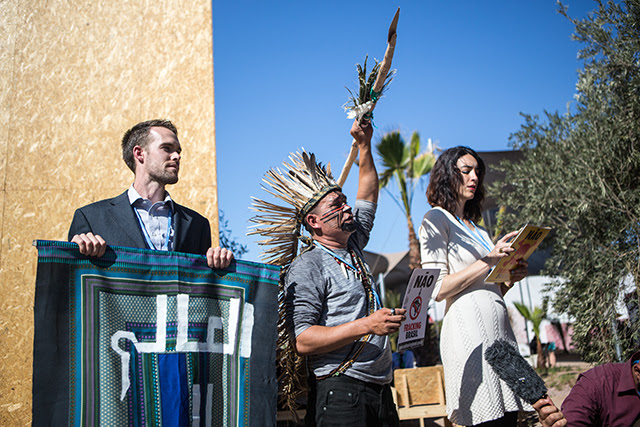
A supporter of the No Fracking Brazil campaign, chief Roberto Anacé, along with Nicole Figueiredo de Oliveira, participated at COP 22, the United Nations Conference on Climate Change, along with representatives of other traditional peoples (Photo: 350.org).
For five consecutive years, Brazil is the most violent country to fight for the environment and the climate of the planet. According to a report from the Global Witness organization ,released last week, the year 2016 hit a record number of killings of leaders and activists who advocate for land rights and nature protection. Again at the top of the list, Brazil accounted for 49 of the 200 deaths mapped last year. According to one of the researchers responsible for the study, this number is probably higher, but cases, or their actual causes, aren’t always reported.
The advance of the agricultural border, in addition to the construction of large infrastructure projects such as dams and hydro power plants, are the vectors behind this scenario. Most of the murders occurred in the Amazon region, mainly in the states of Rondônia, Pará, and Maranhão, where loggers and large landowners are the main suspects. According to the organization, the lack of protection for activists, coupled with the weakening of environmental and indigenous rights laws, has helped fuel violence.
Although they are the most affected ones, these states do not have a protection program that guarantees the safety of the victims. The Program for the Protection of Human Rights Activists from the Government Secretariat of the Presidency of the Republic serves seven states of the country, but not those who need it most. According to the organization, corruption also plays a crucial role, as it ensures quick and often irregular approval of timber and agribusiness projects. “Activists are forced to speak out, and in many tragic cases, are silenced by their actions”, said one of the organizers of the report.
The trend is that this violence will increase, as agribusiness wants to expand its activities by clearing another 15 million hectares by 2026, according to industry data. “Global Witness believes that the land situation and, consequently, the situation of environmental activists in Brazil, will drastically worsen if the government’s plans to reverse indigenous rights and environmental protection go ahead. President Temer has already diluted laws and institutions related to human rights and the environment. If he continues to bow down to the agricultural lobby, the killings of activists are likely to increase”, said the organization.
For chief Roberto Marques, leader of the Anacé indigenous people, from Ceará, who is also on the death threats list in Brazil, this is a very serious issue, beyond the individual life of each of the victims. “In my daily struggle, we are threatened all the time. I recently reported a destruction within our territory. We have to do this. It’s the only way to protect man from himself. The risk is compounded when we embrace a just cause for the collective, but it goes against the interests of those who control all the money.”
According to him, whose territory is not demarcated to this day, Funai’s lack of agility (the National Indian Foundation – Brazilian government body that establishes and carries out policies relating to indigenous peoples) and that of other competent bodies adds to other factors, such as the power of large construction companies, oil companies, and permissiveness of the authorities. “We fight at grassroots. And we do not give up our tradition, our knowledge, our land. If the government wants to kill the land, then it will kill us too. It may already be all lost, but we won’t go down without a fight”, said Roberto Anacé.
Global Witness says that, although few cases of deaths directly linked to oil and gas in the Brazilian Amazon have been found, it is worrying that these concessions are being given without the prior informed consent of the local communities. “This is the heart of the cause of the attacks on the activists. People feel compelled to fight projects when they have no voice in what happens to their lands and the natural resources present in them. Granting new licenses for oil and gas exploration without the participation of local communities in the decisions is the perfect recipe to attract more violence”, said the organization’s spokesperson.
The institution blames governments, companies, and investors for the background that leads to the deaths. “They need to address the causes of increased violence, not to authorize or participate in the projects. In addition, the killers need to be held accountable.”